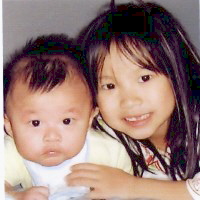
|
Is That
Kafka?
41 An Unwritten Story
Kafka often read to his friends, and presumably also to his sister Ottla, from his unfinished works, particularly his three novels. However, he generally said nothing about his literary projects still in their early stages, or those he had not yet begun. A rare exception was the idea for a story that he revealed in January 1918 to the writer Oskar Baum, one of his closest friends. Baum was visiting Kafka in the village of Zurau [Sitem) in northwestern Bohemia, where Ottla was hosting her brother during the winter, after he had fallen ill with tuberculosis. Since Baum and Kafka slept in the same room, they had the opportunity for long conversations, and Baum later recounted that he had learned more about Kafka in that one week than in the ten years before or the five years after. Kafka also told him about numerous literary outlines and plans "which he had no hope, or even intention, of ever carrying out." Baum remembered one of these unwritten stories very clearly: A man wants to create the possibility of a social event that takes place without anyone being invited. People see and speak to and observe one another without knowing each other. It is a banquet where everyone can eat according to his taste without imposing on anyone else. Each person can arrive and leave whenever he pleases, he has no obligations to the host, and yet the host is always genuinely pleased to see him. When the man finally succeeds in executing his absurd idea, the reader recognizes that this attempt to rescue people from their solitude has in the end only produced-the invention of the coffeehouse. 
@ Irwin, Cali [Gấu đó ư, Quán Chùa đó ư?] Trường hợp đặc biệt, thuộc loại hiếm quí, là cái truyện ngắn sau đây, nó thuộc về 1 thứ, mà, như K thố lộ với bạn, ông, “vô hy vọng, vô toan tính, thực hiện”. Một người đàn ông muốn tạo ra 1 khả dĩ thực hiện được, một sự hiện xã hội, xẩy ra, mà không ai được mời. Khách khứa nhìn, nói, với nhau, chẳng ai quen biết ai. Đó là 1 bữa tiệc mà mọi người ăn uống theo khẩu vị của mình, không ai đòi hỏi, với bất cứ ai. Mỗi người, tới rồi rời bất cứ khi nào muốn, chẳng có bắt buộc gì với chủ nhân bữa tiệc, và chủ thì tỏ ra rất hài lòng một cách thực tình về cái chuyện được gặp khách. Khi người đàn ông, sau cùng, thành công trong cái chuyện thực hiện được cái ý nghĩ phi lý của mình, độc giả nhận ra rằng cái toan tính này, là để cứu vớt đồng loại ra khỏi nỗi cô đơn của họ, và cái mục đích sau cùng của nó, chỉ là để mở 1 quán cà phê! 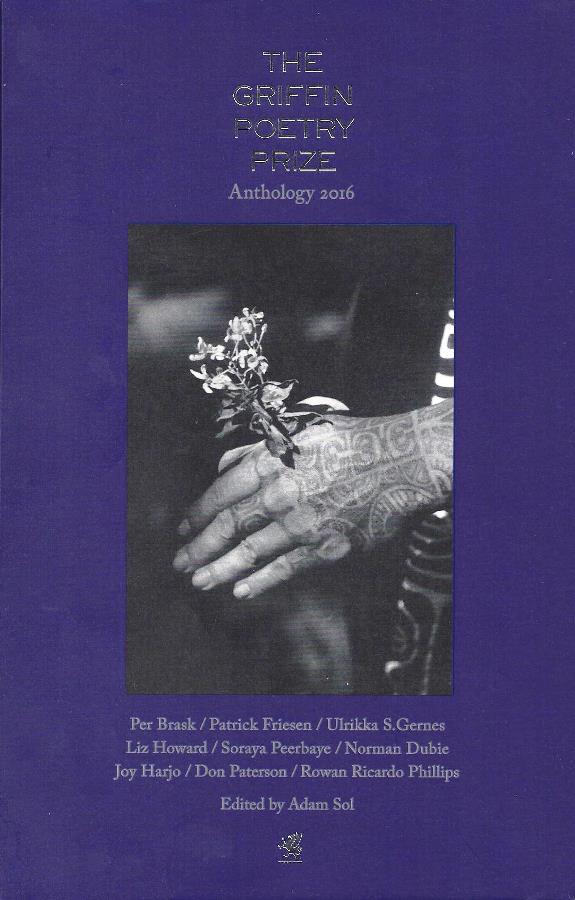
For a Drowned Poet
after Du Fu
An October wind
has cleared the sky and the brown waters clarify their depths. What might one reflect in this empty hour? When will the wild geese bring their high word? I whisper with one fool enough to choose perfection of the work. How hell rejoiced. I mail this poem for him into the river. Don Paterson Dành cho 1 thi sĩ tự trầm
Theo Du Fu
Gió Tháng
MườiQuét sạch bầu trời Và những vùng nước nâu Làm trong chúng, tới tận đáy Gấu nghĩ gì, ở nơi quán trống vắng, như trên? Vào cái giờ trống vắng, của một MCNK không hề có? [Hà, hà!] Khi nào thì lũ vịt giời Mang tới Cái từ, cao thật cao, của chúng? Gấu thì thầm với một con Khùng, đủ để mà chọn Sự toàn hảo của trang Tin Văn How hell rejoiced Gấu mail cái bài thơ này Cho hải âu của Gấu Thay vì, 1 ngỗng giời! Note: Du Fu, Lý Bạch ư? Du Fu là phiên âm latinh của Đỗ Phủ, còn Lí Bạch là Li Bai, thưa bác! Kính, DV Tôi post, là cũng có ý hỏi DV. Tuy nhiên, “nhà thơ chết đuối”, thì phải là Lý Bạch. Hay là tác giả bài thơ, lầm? Tks Take Care. Nhân tiện, btw, by the way, nhớ gửi thơ. Ăn mừng thượng thọ, như nhà thơ DS, ông con trai của TTT, dự tính, đi 1 đường hoành tráng, 10 năm ông anh, đi, tám bó thằng em, tới? 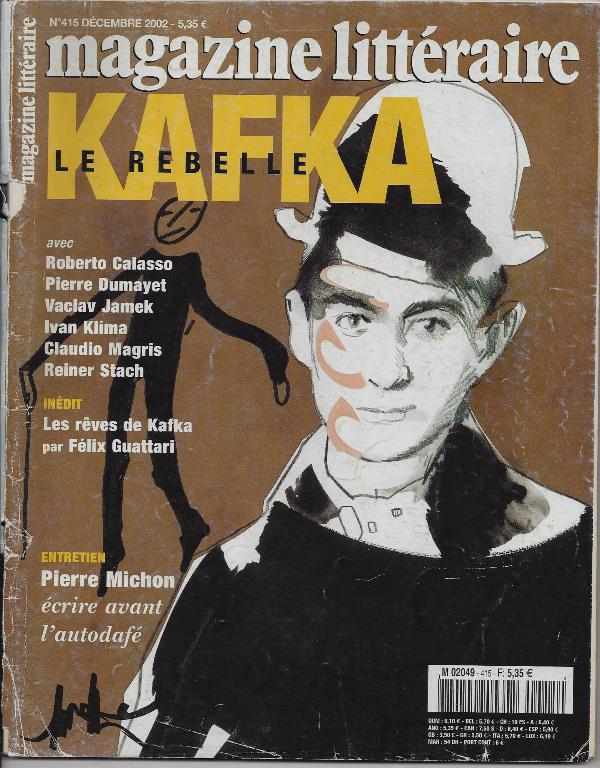
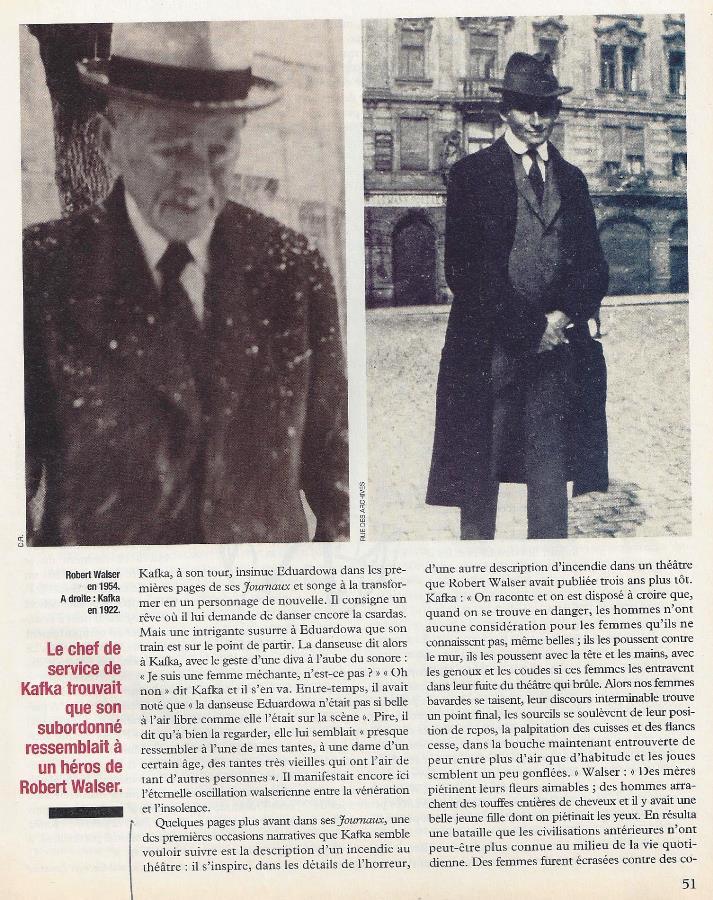
14 What Makes Kafka Cry
Crying is especially alarming
for me. I cannot cry. When other people cry, it seems to me like
a strange, incomprehensible natural phenomenon. Only once in many
years have I cried, two or three months ago, but it made me shake
in my armchair, twice in a row, and I was afraid that I would wake
my parents in the next room with my uncontrollable sobbing; it happened
at night, and the cause was a passage in my novel. It was one of Kafka's true idiosyncrasies that he was much more easily moved by the fates of other people than by his own suffering-and it didn't matter whether those people were real or fictional. This only strengthened Kafka's sense that he had no true connection to real life at all. “I am able to enjoy human relationships, but not to experience them,” he wrote to his fiancée Felice Bauer in 1913, after a movie had brought him to tears. Since the same thing happened to him at another cinema just two weeks later-when he was in the midst of a serious crisis-one can easily assume that the sad scenes in these movies gave Kafka emotional access to his own grief. In two cases, texts that brought Kafka to tears can be identified precisely. "Sobbed over the report of the trial of 23-y.o. Marie Abraham," he noted in his diary, "who strangled her almost 3/4-year-old child Barbara due to poverty and hunger, using a man's tie that she'd been wearing as a garter. Very formulaic story." The word "formulaic" is striking here, since it would generally be used to describe the quality of a plot. But repeated thousands of times, this social formula made the "story" just as bleak for Kafka as a cheap novel. The jurors seem to have seen it the same way. As the exhaustive account in the Prager Tageblatt (published the evening before Kafka's thirtieth birthday) attests, they not only acquitted the servant girl of the crime, they also spontaneously collected money for her. Several years later, in autumn1916, Kafka wrote to Felice Bauer: "At one point I had to stop reading and sit on the couch and cry out loud. I hadn't cried in years." His reference is to Arnold Zweig's drama Ritualmord in Utigarn (Ritual Murder in Hungary), which in fact he generally viewed quite critically. However, toward the end of the play, there is a powerfully moving scene in which the mother of the murder victim, now blind and resigned to her fate, unwittingly meets her daughter's killer and takes him for a benefactor. There seems to have been only one occasion when Kafka entirely lost his composure in the presence of others: after bidding his final farewell to Felice Bauer. On that day, in late 1917, he turned up unannounced at the office of Max Brod, who later described the scene in his biography of Kafka: "Just to rest for a moment, he said. He had just taken F. to the train. His face was pale, firm, and severe. But suddenly he started crying. It was the only time I ever saw him cry. I will never forget that scene-it was one of the most horrible things I have ever experienced." The next day, Kafka wrote to his sister Ottla that he had cried more that morning than in all the years since his childhood. 26 Three Letters to His Father
Kafka's lengthy letter to his father, composed in mid-November 1919 in Schelesen (Zelizyj, is now considered to be one of the most powerful and paradigmatic father-and-son confrontations. Less well known, however, is the fact that this letter had a precursor, which Kafka abandoned after just a few pages. Unlike the finished "Letter to His Father," this earlier draft is still formally addressed to both of his parents, although the true addressee is clearly just his father: Dear Parents, on the evening when Hugo Kaufmann last visited us, and you Father, Karl, and Hugo discussed various business and family affairs, I later overheard you from the bathroom, complaining to Mother about my lack of engagement in the conversation. It was not the first time that I have heard you make these sorts of accusations against me, Father, and you have not always done it through closed doors, you have also said it directly to my face, and your accusations have not been not limited to my lack of engagement, Father, as weighty as that is in itself-still, your criticism that evening, although I could not even hear all of it clearly, made me even sadder than usual. For a long time I sought some way out, until finally, as I lay in bed, it occurred to me that I could write you a letter and explain everything, since you would have time to read at the spa. This idea gave me such joy that I thought at once of 100 things that I must write to you, and moreover of a system that would make them completely persuasive. The next morning, though, while my joy about the idea was still there, as it still is today, my confidence in my own ability to carry it out is lacking, although in the end my task comes down to the most basic things. So I am beginning this letter without self-confidence, and only in the hope that you, Father, will still love me in spite of it all, and that you will read the letter better than I write it. If you think back a bit, Father, I'm sure we agree that our relationship in the past few years has been almost unbearable at times. (My relationship to Mother may not be fundamentally different, but because of her unlimited selflessness, which relieves me of all my duties to her, I do not see that and barely feel it.) I am to blame for this unbearable relationship, I alone. In general I have not concerned myself with your affairs even as much as a casual acquaintance would have done (to say nothing of a son's duties), and when I did concern myself with them, it was clear that I was only doing so under pressure; I have not fulfilled my responsibilities to my Sisters, and in that respect I have not relieved you of any troubles; This draft, which cannot be dated, has a much more defensive tone than the finished letter; therefore it was certainly written before 1919, possibly years earlier (Hans-Cerd Koch, the editor of Kafka's letters, considers May 1918 to be the most likely date). Apparently this draft was written before several family conflicts arose, cases where Kafka considered his father to be clearly in the wrong- particularly Hermann's alienation from his daughter Ottla, as well as the conflict surrounding Kafka's recent engagement to Julie Wohryzek. When Kafka told his parents in September 1919 that he intended to marry Wohryzek, a woman of modest means, his father berated and humiliated him. After that altercation, Kafka felt a need to settle a score, not merely to explain himself. In addition to this draft and the famous later letter, Kafka made at least one more attempt to resolve their differences in writing. In April 1918, as he prepared to return to his parents' apartment in Prague after spending months on a farm where his sister Ottla was the caretaker, he sent a letter in advance to his father. In it, Kafka apparently touched on quite uncomfortable topics, especially his father's aversion to the country life that Ottla had chosen-an aversion so intense that the mere mention his youngest daughter was sometimes enough to make their father fly into a rage. This letter is no longer extant but evidence of its impact can be seen in an unpublished letter written to Ottla by her close friend, their cousin Irma. Irma worked in Kafka's father's fancy goods store, so she was particularly subject to his moods. On April 25, 1918, five days before Kafka returned to Prague, Irma complained to Ottla about "the mess Franz made for me with his letter to your father." 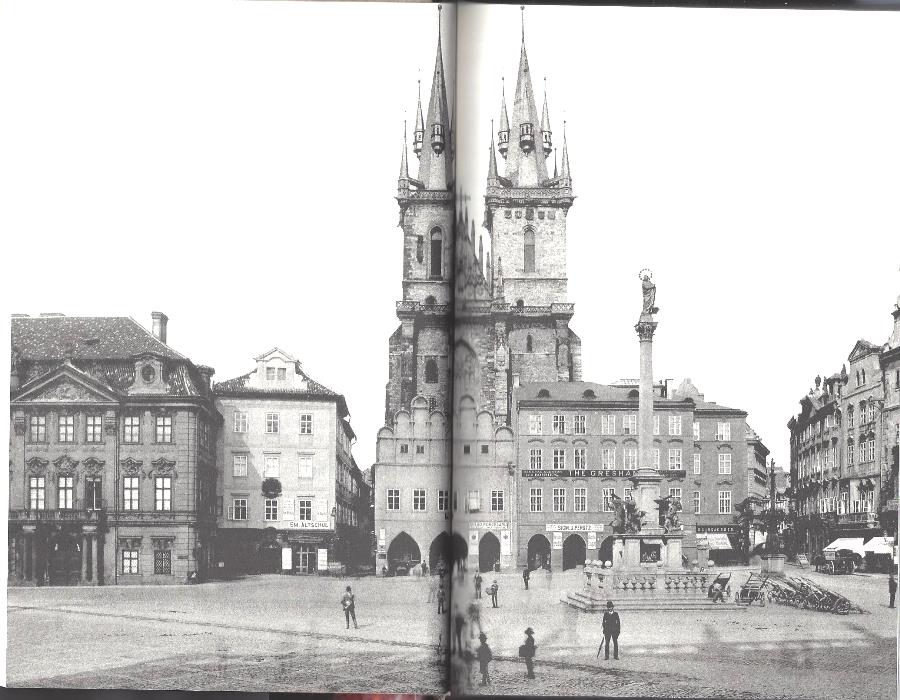
Prague, Old Town Square, ca. 1880 1. The Hapless Benefactor
Once, when I was a very little boy, I'd received a ten-kreuzer coin, a Sechserl, and I was very eager to give it to an old beggar woman who used to sit between the Old Town Square and the Little Square. But now it seemed to me like a tremendous sum, probably a bigger sum than any beggar had ever received, so I was ashamed of doing something that would seem so tremendous to this beggar. Still, I had to give it to her, so I changed the Sechserl, gave the beggar one kreuzer, ran all the way around the town hall complex and the arcades lining the Little Square, came back from the left as a brand new benefactor, gave the beggar another kreuzer, started running again, and cheerfully did the same thing ten times. (Or maybe somewhat fewer, since I think the beggar later lost her patience and slipped away from me.) In any case, in the end I was so exhausted, in moral terms as well, that I ran straight home and cried until my mother gave me another Sechserl. You see, I have bad luck with beggars, and yet I hereby declare that I am prepared to slowly payout my entire present and future fortune in the smallest Viennese banknotes to a beggar woman there by the opera house, on the condition that you are standing beside me and I may feel you near me. 1. Kẻ làm phúc rủi ro Ui chao, chạy 10 cú như thế, khiến tôi bã người. Tôi bèn về nhà, khóc nức nở, khiến bà mẹ của tôi thương hại, bèn cho tôi 1 đồng 10 xu khác! Bạn thấy đấy, tôi đúng là 1 thứ không may, kẻ mang rủi ro tới, ngay cả cho 1 người ăn mày già! Kafka [GCC dịch thoáng] Ui chao, đúng là THNM, bèn nhớ đến BHD, và cái lần được em tin cậy, ra lệnh, mi đưa cho ta tí tiền lẻ… Sao tin cậy Gấu đến như thế, mà nỡ bỏ Gấu, lấy 1 đấng vác gạo! Sự thực, ông chồng, là bác sĩ. Nhưng giỏi đoán ý của ông bố vợ tương lai, từ khi còn là sinh viên y khoa. Cứ mỗi lần Saigon rục rịch đảo chánh, là khệ nệ vác mấy bao gạo tới nhà. BHD biểu Gấu, mi ngu quá, không làm như vậy được, nên ta bỏ mi... Among the numerous problems that arose between Kafka and his beloved Milena Iesenska were their very different relationships to money. "Once he gave a beggar woman a two-crown coin," she told Max Brod, "and asked for one crown back. She said that she didn't have any change. We stood there for a good two minutes thinking about how to settle the matter. Then it occurred to him that he could let her keep both crowns. But he had hardly gone a few steps when he grew very sullen. And yet the same person would happily, enthusiastically give me twenty thousand crowns right away, as if it were nothing." She brought up the two-crown coin incident with Kafka on another occasion, but he cleverly defended himself with this childhood Sechserl memory, among other things. Kafka criticized himself for his "greed in minor matters," and when it came to money he could indeed just as easily be petty as generous. He enjoyed giving gifts, even money, but it had to be done entirely of his own free will. He could not easily reconcile himself to making donations under pressure, or to not getting the correct change back, or to spending money thoughtlessly-even if it was "only a Sechserl." 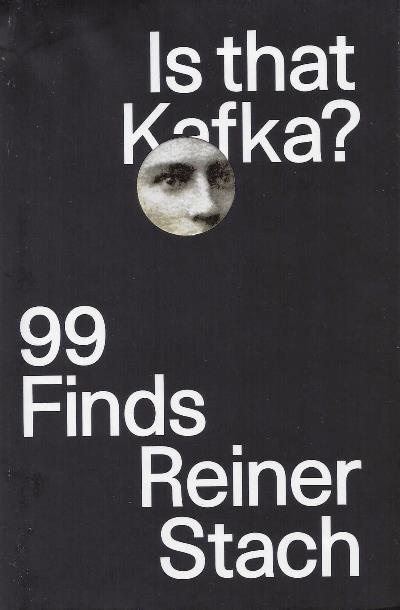
Kafka’s Only Enemy
Kafka's social life is striking for the fact that he was generally well received by all: by men and women, Germans and Czechs, Jews and Christians alike. Not only was Kafka popular among his colleagues and superiors, who had known him for a long time, he was also at ease with the tables of strangers he might join at a hotel or sanatorium, and he was well liked by the more distant acquaintances of his close friends. In his everyday life, Kafka was friendly, helpful, charming, a sensitive listener, but also discreet. His witty, self-ironizing observations prevented anyone from seeing him as a sexual or intellectual rival. Kafka kept his distance from any sort of public feuds, and we find no harsh words for him in the diaries or letters that his close contemporaries left behind. With one notable exception. "The longer I'm away from Kafka, the more I dislike him, with his slimy maliciousness." These words were written by the doctor and writer Ernst Weiss in a letter to his lover, the actress Rahel Sanzara. Weiss had been one of Kafka's few friends not from Max Brod's circle, and he competed with Brod in a certain sense. In Weiss's view, the only way that Kafka could conceivably solve all of the problems in his life was to extract himself from his many obligations and entanglements in Prague, and begin a new literary existence in Berlin. It is not entirely clear what led these two men to part ways, but it seems Weiss was angry that Kafka, who had long promised to write a review of his novel Der Kampf (The Struggle), ultimately declined. The novel was published in April 1916, at a time when Kafka was suffering from a long spell of unproductivity and felt himself incapable of even the slightest literary work, but Weiss saw that as an excuse. "We plan to have nothing more to do with one another until things begin to go better for me," Kafka wrote to Felice Bauer. "A very reasonable solution." In the years after the war, the two writers managed a half-hearted reconciliation, but this did not quell Weiss's latent animosity, which experienced a resurgence after Kafka's death. Thus Weiss assured Soma Morgenstern, an admirer of Kafka, that Kafka had behaved "like a scoundrel" toward him. And as late as the 1930S, Weiss was still portraying his one-time friend as socially autistic, as he did in the magazine Mass und Wert (Measure and Value), even while expressing admiration for his literary work. 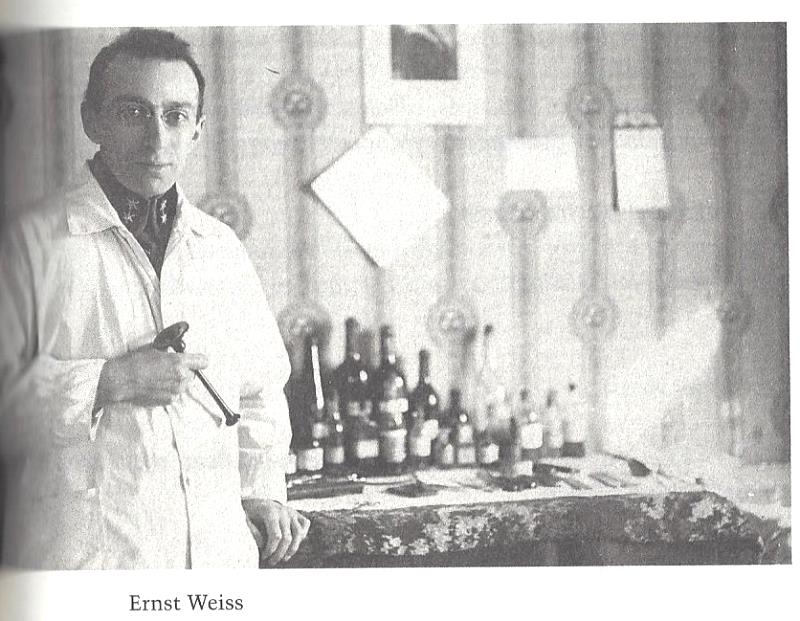
Kẻ thù độc nhất của Kafka.
Nhờ viết bài thổi cuốn sách mà cũng vờ, sao không thù? GCC có nhiều kẻ thù là vậy! 
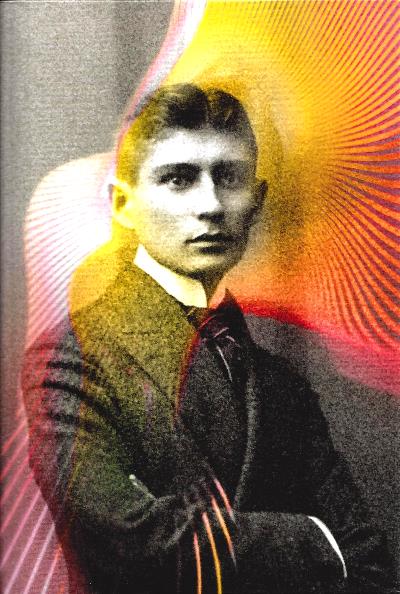
Cuốn này tuyệt lắm. Mới ra lò! 33
Kalka Writes a Poem and loves It Although Kafka occasionally tried his hand at poetry, only a few of his attempts survive, most of them just a few lines jotted down without a title. There is no indication in his own autobiographical writings or in Max Brod's memoirs that Kafka ever considered publishing them. He also never attempted to put his lyric talents to the test by undertaking a more extensive work (as he did for drama with "The Warden of the Tomb"). However, Kafka did treasure a few of his verses and consider them worth preserving. For instance, a calendar page from September 17, 1909 contains the following untitled poem: Little soul you spring up dancing lay your head in the warm air raise your feet from the glistening grass blown in gentle movements by the wind Kafka committed this poem to memory; about two years later, at a coffeehouse, he spontaneously wrote these lines in the autograph book of the collector Anton Max Pachinger (see Find 19). Kafka also carefully preserved the calendar page on which this poem was written. It was kept between the leaves of one of the octavo notebooks he used from 1917-18 in Zurau [Siiem], where he spent eight months on a farm with his sister Ottla. Kafka may have placed the page there while he was using the notebook, perhaps during a brief visit to Prague. Or it may have accidentally been placed in the Zurau notebook while Max Brod wall working on Kafka's papers after his death. But in any case, Kafka must have held onto the poem until he died, since it was only after his death that Max Brod had access to the octavo notebooks. Chúng ta đã biết tài vẽ của đảo xa. Trong 1 bức thư gửi từ Đà Lạt, TTT khen tài vẽ của đx, và thú thực, ông mù tịt trò chơi này. Kafka, ở đây, làm thơ, và thích Nó! 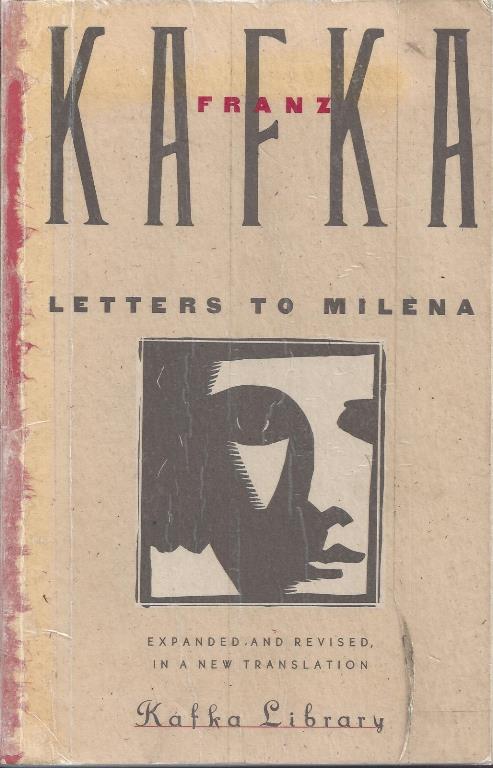
Câu thứ 99, là bài ai điếu Kafka, của Milena - một thứ đảo xa của ông - thì cứ phán đại như thế, đã có trên Tin Văn, lấy từ "Thư Gửi đảo xa/milena" của Kafka. Coi lại, thiếu phần tiếng Anh, sẽ bổ túc sau, thêm cái còm của Stach Dr Franz Kafka, một nhà văn Đức, sống ở Prague, và chết ngày hôm kia, ở Viện điều dưỡng Kierling, gần Klosterneuburg bei Wien. Ở đây ít người biết ông, bởi vì ông là một người sống ẩn dật, một hiền nhân luôn mang nỗi sợ cuộc đời. Trong nhiều năm, ông đau khổ với căn bệnh phổi, và tuy loay hoay tìm cách chữa trị, ông lại như muốn nuôi căn bệnh đó, cưu mang nó trong tư tưởng của ông. Có lần ông viết trong một lá thư: khi trái tim và linh hồn không thể chịu đựng nó được nữa, buồng phổi sẽ chịu giùm nửa gánh nặng, như vậy là nó được chia khá đồng đều - căn bệnh của ông là vậy. Nó cho ông một sự dịu dàng kỳ diệu, và một sự tinh khiết trí thức không đắn đo, câu thúc. Tuy nhiên, chỉ riêng về mặt hình hài thể chất, Franz Kafka dồn lên hai vai của căn bệnh, toàn thể nỗi kinh hãi cuộc đời. Ông là một người cả thẹn, luôn khắc khoải, nhẫn nại, dịu dàng, tuy những cuốn sách ông viết ra thì thật ghê sợ, và đau đớn. Ông đã nhìn thế giới như đầy những quỷ dữ vô hình, vò xé, và tiêu huỷ những con người vô phương chống đỡ. Ông quá tiên tri, quá thông minh để có thể sống, và quá yếu ớt, để chiến đấu. Ông yếu ớt như những con người cao đẹp yếu ớt, những con người không thể chiến đấu chống lại nỗi sợ bị ngộ nhận, chống lại trò ma muội, hay tính toán chi ly, bởi vì họ thừa nhận ngay từ đầu, cái điều của riêng họ, đó là đừng mong chi một sự trợ giúp; sự nhẫn nhục cam chịu này chỉ làm cho kẻ thắng thế hổ thẹn. Ông hiểu thế nhân, một sự hiểu biết mà chỉ một ai cao cả, có một sự mẫn cảm hoài hoài mới có thể có được. Chỉ một ai cô đơn. Chỉ một ai, trong một thoáng nhận ra kẻ khác, hầu như một nhà tiên tri. Sự hiểu biết thế giới của ông thật phi thường, và sâu thẳm; chính ông là một thế giới phi thường và sâu thẳm. Ông đã viết những cuốn sách có ý nghĩa nhất của nền văn chương Đức hiện đại, những cuốn sách cưu mang trong nó sự chiến đấu của thế hệ hôm nay xuyên suốt thế giới - trong khi kìm giữ mọi thiên vi. Chúng thực, trần trụi, và đau thương nên hết đỗi tự nhiên ngay cả khi có tính biểu tượng. Chúng đầy sự khinh miệt khô cằn và là cảm quan của một người nhìn thế giới một cách rõ ràng đến không thể chịu đựng được nó, một người mà nỗi chết không rời, kể từ khi người đó chối từ mọi bon chen hay tìm nơi ẩn trú, như những người khác thường làm, trong những ảo tưởng này nọ, của lý trí, hay của vô thức - kể luôn cả những con người cao cả. Dr Franz Kafka đã viết "The Stoker", chương thứ nhất của một cuốn tiểu thuyết tuyệt vời, vẫn chưa được xuất bản (đã xuất hiện bằng tiếng Czech trên Neumann's Cerven (1), "the Judgment", sự xung đột của hai thế hệ; "The Metamorphisis", cuốn sách mãnh liệt nhất của văn chương Đức hiện đại; "In the Penal Colony"; những tuyển tập Meditation và A Country Doctor. Cuốn tiểu thuyết cuối cùng, Before the Law (2), còn trong dạng bản thảo, sẵn sàng để in ấn, từ nhiều năm. Nó là một trong những cuốn sách, một khi đọc, cho (ta) cảm nghĩ về một thế giới được miêu tả hoàn hảo đến nỗi mọi phê phán sau đó đều chỉ là phù phiếm. Tất cả những cuốn sách của ông vẽ nên sự ghê rợn của những ngộ nhận thầm kín, của niềm ngây thơ tội lỗi giữa những con người. Ông là một nghệ sĩ và là một người với một lương tâm khắc khoải, đến nỗi ông có thể nghe, trong khi những người khác, điếc, cảm thấy, chính họ đang yên ổn. (Národni Listy, June 6, 1924) (1) Milena muốn nói tới tuần báo Kmen, cũng của S. K. Neuman. (2) Đây là muốn nói tới cuốn Vụ Án. Milena chỉ biết có truyện ngắn Before the Law. Hiển nhiên, bà không biết cuốn tiểu thuyết chót của Kafka, Lâu Đài. (Ghi chú của nhà xb Kafka Library). Nguyễn Quốc Trụ chuyển ngữ Immediately after Kafka's death on June 3, 1924, the journalist and translator Milena Jesenská was asked to write an obituary for the Prague-based Czech daily Natodni Listy-apparently they were aware of her special relationship to Kafka. Her text appeared there on June 6 as a "Daily Notice." German-speaking readers did not become aware of this obituary until 1962, when the Vienna magazine Forum published a German translation. Since Jesenska only had a few hours to write the obituary, the text reflects what she knew of Kafka's works at the time. For instance, "The Stoker," which she had translated into Czech herself, is the first chapter of the novel Der Verschollene (known in English as Amerika, The Man Who Disappeared). The novel that she refers to as Before the Law is The Trial; she was clearly thinking of the parable "Before the Law," contained within the novel. She knew this parable, which had already been published in a Czech translation, but probably had not seen the manuscript of The Trial, which had been in Max Brod's desk drawer for years. Jesenska also had to cite the statements from Kafka's letters about the psychic origins of his lung disease from memory. In fact, Kafka had written to her four years earlier: "[I] am only thinking of the explanation that I concocted for my own illness at the time, and which applies to many cases. It was that the brain could no longer bear the sorrows and pains it was subjected to. It said: 'I give up; but if there's anyone else here who has a stake in holding it all together, let him shoulder part of my burden, and then it can go on a little while longer.' The lungs answered this call; after all, they didn't have much to lose. These negotiations between brain and lungs, which took place without my knowledge, may have been terrible." Reiner Stach KAFKA IN PRAGUE, Summer 1996 by Peter Haigh http://www.tanvien.net/ngoai_gia/Milena.html 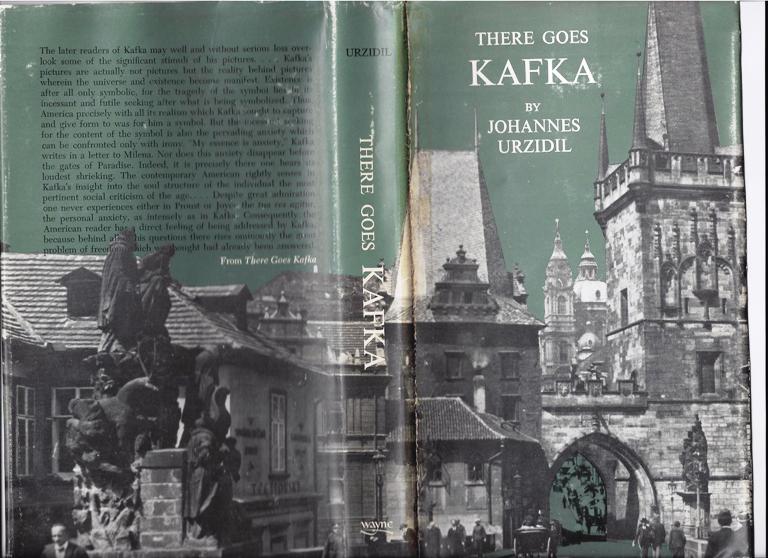
Kafka, hàng độc http://tanvien.net/Day_Notes/Kafka_Coupable.html Sài Gòn là Gấu, và Gấu là Sài
Gòn. Sài Gòn sẽ chẳng bao giờ hoàn tất đến như thế, đặc biệt Sài Gòn
đến như vậy, và nó sẽ chẳng bao giờ lại như vậy, như trong đời của Gấu, khi
ở Sài Gòn! Cái “Sài Gòn là Gấu và Gấu là Sài Gòn”, áp dụng chung cho tất cả chúng ta, Miền Nam, và nó là 1 chân lý, bị cố tình hiểu lầm ra là, toan tính phục hồi cái xác chết VNCH. Cái "gì gì" lịch sử có thể
viết lại nhưng không thể làm lại! [Châm ngôn lừng danh của SCN] (1)
MEMORIAL EULOGY
The text of my eulogy delivered at the
memorial service for Kafka in Prague was slightly longer than the version
subsequently published in the Berlin Kunstblatt. I can no longer recall
exactly what the editor deleted. The suggestion of Kafka's future greatness
and effectiveness, so self-evident today, may at that time not have sounded
so convincing to many people. IN MEMORIAM FRANZ KAFKA
"I see gathered together here the friends
and admirers of a man and a literary artist whose highest human quality
simultaneously produced his most powerful poetic magic. In any case, if
ever there was a perfect instance of the congruence of life and artistry,
it applies to Franz Kafka. This extraordinary man created as he lived, in
the self-chosen hardships of a heartfelt prose made possible by the involuntary
modesty of genuine discernment. The life of such men is fully appreciated
only by those closest to them. Their death, however, unites dispersed people,
their death in no wise represents something negative but rather a great
fact of the spirit-intellect, a nucleus of mysterious and ever cumulative
solidarity. Kết cục thì nó phải như thế đó: Đếch làm
sao giải thích được! Trên TLS, số 7 Sept 2012,
GABRIEL JOSIPOVIC điểm 1 số sách mới ra lò về Kafka - vị thầy gối đầu
giường của Sến - đưa ra nhận xét, vào cái ngày 23 Tháng Chín này, thì
kể như là đúng 100 năm, ngày Kafka viết cái truyện ngắn khủng ơi là
khủng, “Sự Xét Xử”. Và có thể nói, vào giờ này, độc giả chúng ta cũng
chẳng hiểu ông nhiều hơn, so với những độc giả đầu tiên của ông, và có
lẽ sự thể nó phải như thế, nghĩa là nó phải chấm dứt bằng cái sự đếch
làm sao hiểu được Kafka! Ở đây, cũng phải đi 1 đường ghi
chú ngoài lề! 1. Cuốn Bếp Lửa
của TTT, chấm dứt bằng lá thư của 1 tên Mít, là Tâm, bỏ đất
mẹ ra đi, đếch thèm trở về, viết cho cô em bà con, buộc vào quê hương
thì phải là ruột thịt, máu mủ. (1) 2. Cuốn Sinh Nhật
của bạn quí của Gấu, khi mới ra lò, Gấu đề nghị, nên đổi tít,
là Sinh Nhạt, và còn đề nghị viết bài phê bình điểm
sách, “Đi tìm 1 cái mũ đã mất”: Truyện ngắn mà Brod gọi
là "Prometheus", được kiếm thấy trong Sổ Tay Octavo Notebooks, của
Kafka, đã được gạch bỏ [crossed out]. Câu kết thúc của truyện: “Giai
thoại thường toan tính giải thích cái không thể giải thích; bởi vì
dưng không trồi lên sự thực [chữ của TTT, trong Cát Lầy], nó phải lại chấm dứt trong
không thể cắt nghĩa được” Nói rõ hơn, nhân loại không
làm sao đọc được Kafka, vì có 1 thằng cà chớn Gấu "nào đó", nẫng mẹ mất
cái nón đội đầu của ông! (1) Thanh, Viết xong tại Thủ Dầu Một Đọc cái thư thấy sến ơi là sến. Nhưng
phải như thế, thì mới cân bằng được với cái nội dung của 1 cuốn
sách, viết về anh Bắc Kít, Hà Lội, chưa sống đã già, chưa già đã chết,
trong Bếp Lửa.
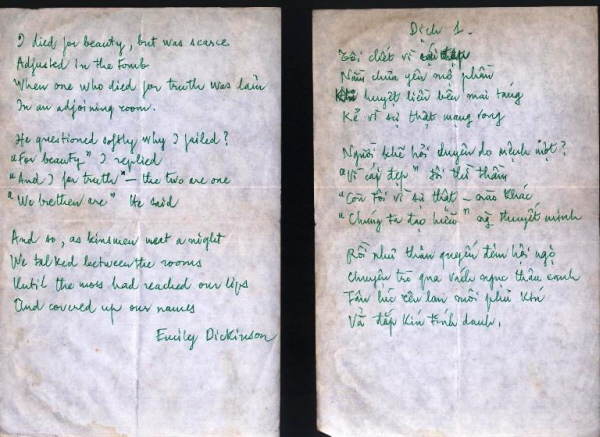
Hiền trong MCNK, có gì giống nhân
vật Khúc Phi Yến trong Tiếu Ngạo Giang Hồ, của Kim Dung, xuất hiện rồi
biến mất. Duy, bạn Kiệt, đã từng tính hỏi bạn mình, Hiền đâu rồi? Còn
Kiệt, thì thú thực với bà vợ Thuỳ, anh đưa cô ta tới… đó, rồi trở
về với em, với con. Bởi là vì với ông, chỗ đó, là
ở trong bài thơ Dickinson, mà ông đã từng dịch, để tạ lòng tri kỷ,
trong đó có Duy, và những độc giả của ông. http://www.tanvien.net/Roman/as_22.html Duy muốn hỏi Kiệt: Hiền đâu? Hiền ra
sao? [Milena letters to Max Brod]
[Bạn có thể tưởng tượng, đây là thư của "đảo xa", gửi cho MT, viết về TTT!] Dear Herr Doktor: [beginning of August 1920] ... Obviously, we are all capable of living, because at one time or another we have all taken refuge in a lie, in blindness, enthusiasm, optimism, a conviction, pessimism, or something else. But he has never fled to any refuge, not one. He [Kafka] is absolutely incapable of lying, just as he is incapable of getting drunk. He lacks even the smallest refuge; he has no shelter. That is why he is exposed to everything we are protected from. He is like a naked man among the dressed ... Everything he is, says, and lives cannot even be called truth; actually, it is predetermined being, being in and of itself, being with nothing added that might allow him to distort his picture of the world- whether into beauty or distress. And his asceticism is completely unheroic-hence all the greater and loftier. All "heroism" is lying and cowardice. This is not someone who chooses asceticism as a means to an end; here is a man who is forced to be ascetic because of his terrible clairvoyance, his purity and inability to compromise. There are very intelligent people who also refuse to make compromises. But they don magic glasses and see everything in a different light. That's why they don't need any compromises. That's why they are able to type quickly and have their women. He stands beside them and gazes at them in wonder, at everything, even this typewriter and these women. He will never understand. His books are amazing. He himself is far more amazing. Many thanks for everything. I wish you all the best. I'm allowed to visit you when I come to Prague, am I not? I send you my most heartfelt greetings. Hiển
nhiên tất cả chúng ta đều có thể sống, bởi là vì lúc này
lúc khác, chúng ta đều có thể kiếm ra nơi ẩn náu, trong 1 lời dối trá,
trong sự mù lòa, hưng phấn, lạc quan, tin tưởng, biếm thế, hay một
điều gì khác. Nhưng anh ta [Kafka] không làm được như thế, anh ta
chẳng bao giờ chạy tới bất cứ 1 nơi ẩn náu, không một nơi ẩn náu. Anh
ta tuyệt đối không thể nói dối, như anh ta không thể say rượu. Anh ta
không có lấy 1 chốn ẩn náu cho dù nhỏ bé nhất. Anh ta không có 1 nơi
trú ẩn. Chính vì thế mà anh ta cứ thế phơi ra trước mọi thứ, mọi điều
mà chúng ta được che chở, từ chúng. Anh ta như thể 1 kẻ trần truồng, giữa
đám người ăn vận quần áo. Mọi thứ, mọi điều anh ta là, nói, và sống,
không thể, ngay cả, được gọi là sự thực; sau cùng, đây là một sinh
vật được tiền định, tính toán từ trước, một sinh vật ở trong nó, và của
chính nó, có mà chẳng cần hư vô thêm vào, cái hư vô có thể cho phép
anh vặn vẹo hình ảnh của anh ta về thế giới - trở thành cái đẹp, hay
sự chán chường, kiệt quệ. Và chủ nghĩa khổ hạnh của anh ta thì hoàn
toàn không-anh hùng - từ đó, tất cả lớn lao, cao vời vợi. Mọi “chủ
nghĩa anh hùng” thì là dối trá, hèn nhát. Đây không phải là 1 kẻ
chọn khổ hạnh, như là một phương tiện đưa tới cứu cánh; dây là 1 người
đàn ông bắt buộc khổ hạnh bởi là vì cái tiên tri khủng khiếp của anh
ta, sự trong trắng của anh ta, và cái không thể thoả hiệp của anh ta.
1957 Life finds a thousand ways to cheat lovers. Đời kiếm đủ cách để gạt những kẻ yêu nhau
|